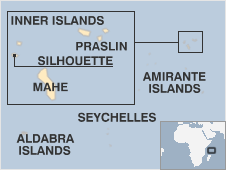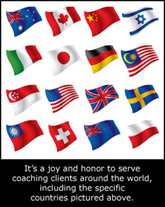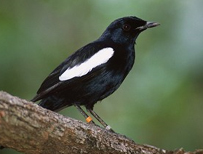 Country profile: Seychelles
Country profile: Seychelles
 General Information
General Information
Area: 455.3 sq km (175.8 sq miles).
Population: 80,410 (official estimate 1999).
Population Density: 176.6 per sq km.
Capital: Victoria (Mahé). Population: 60,000 (1994).
GEOGRAPHY: The Seychelles Archipelago occupies
400,000 sq km (150,000 sq miles) of the Indian Ocean
northeast of Madagascar and contains 115 islands and
islets. These fall into two groups of markedly
different appearance, stemming from their distinct geologies:
Granitic: A dense cluster of 42 islands, the only mid-ocean group in the world with a granite rock formation. Their lush green vegetation is tropical in character, with a profusion of coconut palms, bananas, mangoes, yams, breadfruit and other tropical fruit. Indigenous forest exists on the higher slopes, where cinnamon and tea are planted. All, including the second largest, Praslin, are less than 65km (40 miles) from Mahé.
Coralline: Isolated coral outcrops speckling a vast area of the Indian Ocean to the southwest of the granitic group. They rise only a few feet above sea level but are covered with rich and dense vegetation due to fertilisation by copious amounts of guano. There is no permanent population. Aldabra, the largest atoll in the world, contains one-third of all Seychellois land and is a UNESCO-designated World Heritage Site.
The largest island in either group is Mahé, lying 4°S of the equator. It is 27km (17 miles) long by 8km (5 miles) wide and contains Victoria, the capital and main port, and 90 per cent of the population. Mahé is typical of the Granitic Islands, being mountainous and covered with jungle vegetation. Its highest point, indeed the highest point in the Seychelles, is Morne Seychellois (905m/2970ft). The isolated nature of the Seychelles has given rise to the evolution of many unique species of flora and fauna, including the coco-de-mer palm and unique varieties of orchid, giant tortoise, gecko, chameleon and ‘flying fox’ (fruitbat). National parks and reserves have been set up to protect this heritage. The Seychellois are descended from a mixture of French and British landowners, freed African slaves and a small number of Chinese and Indian immigrants, creating a unique culture.
After an ominous, post-independence start which saw them lurch from a coup, through an invasion by mercenaries to an abortive army mutiny and several coup attempts, the Seychelles have attained stability and prosperity.
Citizens of the Indian Ocean archipelago enjoy a high per capita income, good health care and education.
Overview
But just a year after independence in 1976, the Seychelles appeared to be heading down the path of instability which has plagued many African states.
 |
AT-A-GLANCE
Politics: The Seychelles People's Progressive Front (SPPF) has been the ruling party since 1977, when France Albert Rene came to power in a bloodless coup
Economy: Tourism and the fishing industry are the country's biggest foreign exchange earners
|
The prime minister, France Albert Rene, overthrew the president, James Mancham, and embarked on a programme aimed at giving poorer people a greater share of the country's wealth.
His coup, though bloodless, resulted in about 10,000 islanders fleeing the country. Four years later, with the help of Tanzanian troops, Mr Rene thwarted an attempt by South African mercenaries to restore Mr Mancham.
An army mutiny in 1982, followed by several attempted coups, suffered a similar fate.
But in 1991, possibly in response to pressure from foreign creditors and aid donors, Mr Rene restored multi-party democracy.
The country's economy depends heavily on a fishing industry and upmarket tourism; the latter is vulnerable to downturns in the global travel market. Fine beaches and turquoise seas are among the main attractions.
The archipelago is home to an array of wildlife, including giant tortoises and sea turtles. Much of the land is given over to nature reserves.
Facts
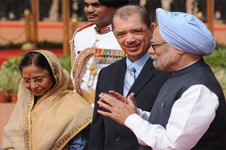 President Pratibha Patil and Prime Minister Manmohan Singh with President of the Republic of Seychelles James Alix Michel (centre) during a ceremonial recpetion at the Rashtrapati Bhavan in New Delhi on Wednesday President Pratibha Patil and Prime Minister Manmohan Singh with President of the Republic of Seychelles James Alix Michel (centre) during a ceremonial recpetion at the Rashtrapati Bhavan in New Delhi on Wednesday
|
- Full name: The Republic of Seychelles
- Population: 84,600 (UN, 2006)
- Capital: Victoria
- Area: 455 sq km (176 sq miles)
- Major languages: English, French, Creole
- Major religion: Christianity
- Life expectancy: n/a
- Monetary unit: 1 Seychelles rupee = 100 cents
- Main exports: Fish, cinnamon bark, copra, petroleum products (re-exports)
- GNI per capita: US $10,290 (World Bank, 2008)
- Internet domain: .sc
- International dialling code: +248
Leaders
President: James Michel
James Michel succeeded France Albert Rene, who led the country for almost three decades before stepping down in April 2004.
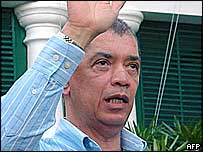
President James Michel succeeded veteran leader Albert Rene
|
In July 2006 Mr Michel won a five-year term in presidential elections.
A former vice president, he had served alongside Mr Rene since 1977, when a bloodless coup brought the long-term leader to power.
Mr Michel pledged to hold a more open dialogue and to involve the private sector in the debt-ridden national economy. Some analysts have praised him for executing long-needed but painful reforms to liberalise the economy.
Mr Michel, a former teacher, entered politics in 1974. He had a 16-year military career and retired from the armed forces in 1993 with the rank of colonel.
The president is the head of state and appoints the Council of Ministers - an advisory body. Most members of the legislative body, the national assembly, are directly elected. Michel also holds the defence, police, information, and risk and disaster management portfolios.
In the 2006 elections he gained nearly 54% of the vote compared with the almost 46% won by Anglican priest Wavel Ramkalawan. In the 2001 polls Ramkalawan won 45% compared with Rene's 54%.
In the May 2007 elections, the Seychelles People's Progressive Front retained all 23 out of the 34 seats in the national assembly. The opposition Seychelles National Party (SNP) took the remaining 11 seats.
Media
The government controls much of the islands' media, and operates radio and TV stations and the sole daily newspaper.
Freedom of speech has improved since one-party rule was abolished in 1993, and private or pro-opposition publications have been robust in their reporting despite tough libel laws.
However, the opposition weekly Regar has regularly been sued for libel by the authorities. In October 2006 it stopped publication in protest against what it called constant threats from the government.
Steep licensing fees have discouraged the development of privately-owned broadcast media.
Multi-channel cable and satellite TV services are widely available. The BBC World Service and Radio France Internationale are available on FM.
The press
Television
- SBC TV - state-run, operated by Seychelles Broadcasting Corporation (SBC)
Radio
- SBC - operates national mediumwave (AM) service and music station Paradise FM
News agency
AFRICA | ASIA-PACIFIC | AMERICAS | EUROPE | MIDDLEEAST | SOUTHASIA



Mauritania Mauritius Morocco Mozambique Namibia Niger Nigeria Republic-of-congo Rwanda Sao-tome-and-principe Senegal Seychelles Sierra-leone Somalia South-africa Sudan Swaziland Tanzania The-gambia Togo Tunisia Uganda Australia Brunei Burma Cambodia China East-timor Fiji Indonesia Japan Kazakhstan Kiribati Kyrgyzstan Laos Malaysia Marshall-islands Micronesia Mongolia Nauru New-zealand North-korea Palau Papua-new-guinea Samoa Singapore Solomon-islands South-korea Taiwan Tajikistan Thailand The-philippines Tonga Turkmenistan Tuvalu Uzbekistan Vanuatu Vietnam Antigua-and-barbuda Belize Bolivia Brazil Canada Chile Colombia Costa-rica Cuba Dominica Dominican-republic Ecuador El-salvador Grenada Guatemala Guyana Haiti Honduras Jamaica Mexico Nicaragua St-kitts-and-nevis St-lucia Suriname Trinidad-and-tobago Uruguay Venezuela Albania Andorra Armenia Austria Azerbaijan Belarus Belgium Bosnia-hercegovina Bulgaria Croatia Cyprus Czech-republic Denmark Estonia Finland France Georgia Germany Greece Hungary Iceland Ireland Italy Latvia Liechtenstein Lithuania Luxembourg Macedonia Malta Moldova Monaco Montenegro Norway Poland Portugal Russia San-marino Serbia Slovakia Slovenia Spain Sweden Algeria Egypt Iran Iraq Israel-and-palestinian-territories Jordan Kuwait Lebanon Libya Mauritania Oman Saudi-arabia Sudan Syria Tunisia United-arab-emirates Yemen Afghanistan Bangladesh Bhutan India Nepal Pakistan Sri-Lanka The-Maldive
 General Information
General Information